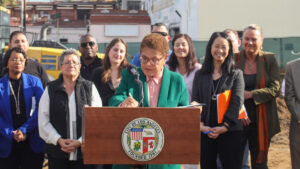We partnered with our friends at the Pat Brown Institute for Public Affairs at Cal State Los Angeles and the Nonprofit Finance Fund to release key information that will guide L.A. County nonprofits and stakeholders to meet the needs of our community. The L.A. targeted survey of nonprofits was part of the NFF’s 2022 National State of the Nonprofit Sector Survey. Nonprofit partnership is crucial to tackle Los Angeles County’s most pressing issues. Our findings clearly laid out what lies ahead: the need for direct services is not going away.
Due to the pandemic, the vast majority of L.A. nonprofits have seen an increase in demand for services due to the pandemic, 90% of whom expect that demand to increase. Nearly half said they don’t expect to be able to meet the growing need.
Key Findings:
- Challenges from increased demand due to pandemic persist. A large majority (72%) of L.A. nonprofits reported a significant increase in demand, while fewer than half (48%) reported being able to meet increased demand between FY2019-2021.
- Advancing racial equity has been central to L.A. organizations. BIPOC leaders paving the road for change. More than half (55%) of BIPOC-led organizations reported that racial equity was a major programmatic focus of their work vs. a small group (16%) of white-led organizations who could agree. On the upside, white-led nonprofits conducted DEI practices at higher rates since 2020.
- While funding increased overall, racial inequities persist. Funding increased during the pandemic particularly for white-led nonprofits and only a quarter of Black-led nonprofits report having reserves.
- L.A. nonprofits have different experience than non-L.A. nonprofits in survey. L.A. nonprofits are more likely to have publicly advocated for programs to advance racial equity in their communities compared to other areas.
- L.A. nonprofits have urgent need for full cost funding and staffing support. Among main concerns are offering competitive pay (52%), employing enough staff (54%), high cost of living (38%), and staff burnout (35%). Achieving long-term financial sustainability (78%) is the top financial challenge for L.A. nopnprofits.
Report Highlights:
- The majority (59%) of L.A. nonprofit leaders are BIPOC, however BIPOC-led nonprofits tend to have smaller budgets compared to white-led organizations.
- Most organizations (72%) provide direct services.
- L.A. organizations wait longer to be reimbursed by government compared to nonprofits across the country.
To not go back to a pre-pandemic Los Angeles, additional financial support for BIPOC-led organizations and long-term financial support will help to reduce racial inequities and respond to the growing need for direct services. Creating data with our partners is a first step to building an informed approach to make #NoGoingBack a reality. The Committee for Greater Los Angeles is proud to step up to the challenge of providing civic leaders with the tools needed to civic leaders build a recovery plan for L.A. County’s most marginalized communities.
Read the full report here.



